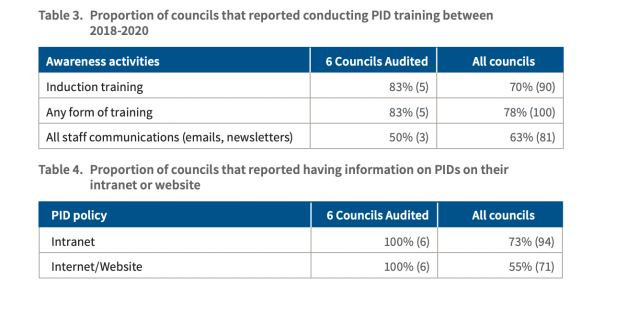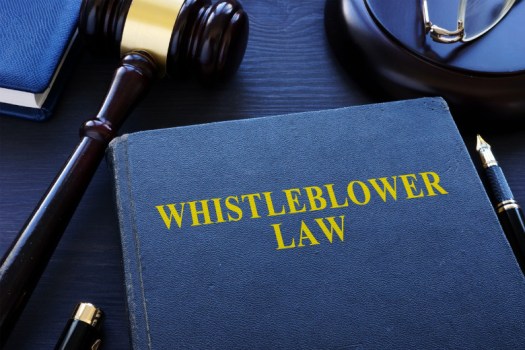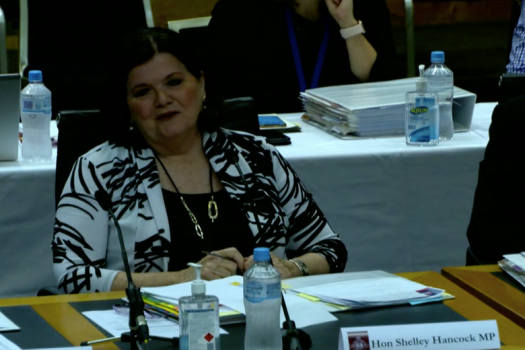
An audit of whistleblowing at six NSW councils has found there may be cultural barriers to reporting serious wrongdoing in local government.

Barriers could include a lack of trust in ‘head office’, an ‘us versus them’ mentality and a culture of not ‘dobbing in a mate’, the NSW Ombudsman’s report released on Monday says.
The audit, undertaken to identify whether local government culture, systems or practices could be contributing to a failure by staff to make public interest disclosures (PIDs), highlights the need for local councils to ensure whistleblowing is encouraged, identified and reported.
It contains the findings of audits on six local councils, none of which were found to have received any PIDs for three years between 2018 and 2020.
Overall, only that 66 per cent, or 85 of NSW’s 128 councils received a PID between 2018 -2020. Fifty two of those councils employed more than 150 staff.
The data also indicates that local councils are less likely than universities, local health districts and state government agencies of a similar size to receive whistleblower complaints.
“The willingness of public servants and employees at all levels to report serious wrongdoing is essential to maintaining the integrity of the public sector. In all six audited councils, however, we found that there may be cultural barriers to reporting,” Ombudsman Paul Miller says.

Legal obligations
Agencies and agency heads have a range of obligations under the PID Act, including having a whistleblower policy and at least one officer designated to receive PIDs.
The audits assessed whether the audited councils were complying with their legal obligations, and whether the way in which they did was conducive to a strong reporting culture and practice.
The report says some councils showed “positive or improved” PID practices. But invesigations also revealed cultural barriers to reporting, limited staff awareness and lack of training and information.
“We found that all the councils could make improvements to their reporting culture and PID practices,” the report concludes.
Mr Miller has urged all councils and other NSW agencies to review the report, which he says may contain material relevant to their organisations.
“Although limited to these 6 councils, there are lessons in this report more generally for the local government sector in how to better promote positive PID handling practices and reporting culture,” he says.
The report makes several recommendations, including
- Assessing whistleblowing culture via a staff survey
- developing tailored PID training and awareness programs
- boosting the number of PID officers
- making sure there’s a range of accessible reporting mechanisms
Comment below to have your say on this story.
If you have a news story or tip-off, get in touch at editorial@governmentnews.com.au.
Sign up to the Government News newsletter



I wish the Ombo would audit themselves, and their relationship to other State government departments instead of continually punching down. It is very cosy. Local government are routinely harrassed and bullied by State government staff leveraging off their paternalistic mindset toward the third tier of government. Withholding of funds, unnecessary audits, delayed delivery of funds, changing of reporting requirements can all be wielded with malice, and often are.
Whistleblowers will not come forward as the Code of conduct is used as a weapon by higher management to intimidate local government employees from speaking out.
Whistleblowers in LG generally bring to light issues for public good, but in doing so, they destroy their careers, lose their income & suffer mental health issues when they speak out. Perpetrators of unethical behaviour, generally termed as grey corruption typically climb the ranks unrestrained & protected by threats of fines for councillors & as Ralph mentioned Codes of Conduct. Government & councils continue to strengthen employee Conduct codes, ultimately forcing a whistleblower to decide to feed their family & move on OR create a better place for all and speak out.
I witnessed why Council employees would be hesitant to become whistle blowers during (a recent) Public Inquiry. A number of very brave Council employees gave evidence during the inquiry only to have their employment terminated a short time after and was their any consequences for the Senior Management who penalised these workers, certainly not. Did the State Government Inquiry step in to protect these Council Workers? Certainly not, so what incentive is their for a Council Worker to report corruption? None!